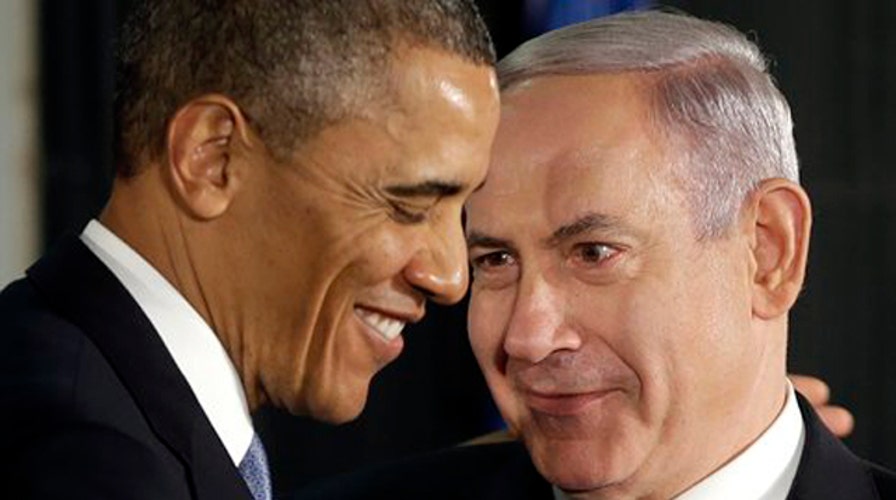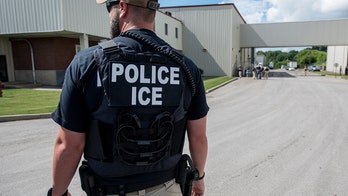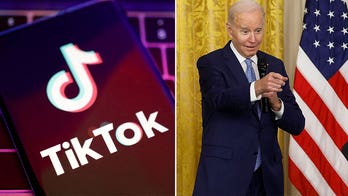Does Obama really have Israel's back?
After 5-year absence, president tries to reassure nation it has a special ally in the US
After staying away for five years, President Obama arrived in Israel Wednesday declaring the U.S. Israel's "greatest friend" -- kicking off a whirlwind tour that could serve more to boost his battered image in the country than jump-start peace talks.
The president spoke briefly about the cause of peace, after a meeting with Israel's President Shimon Peres.
"In this work, the state of Israel will have no greater friend than the United States," Obama said.
Peres praised Obama for an "impressive record of answering our needs," and welcomed the message that "no one should let skepticism win the day."
The president made a swing through Tel Aviv before heading to Jerusalem for his meetings with Israeli leaders. The trip is Obama's first as commander-in-chief. Yet he faces an increasingly challenging landscape -- with the formation of a new government that could prove more resistant than the last to the kind of framework for peace he envisions.
The president already has a notoriously cool relationship with Israeli Prime Minister Benjamin Netanyahu, with whom he will meet this week. But with peace talks effectively off the rails, it's unclear whether Obama can make any inroads with the new government in pursuing a two-state solution, especially in the wake of the Palestinians' defiance of Israel and the U.S. in getting the United Nations last year to recognize their statehood.
Netanyahu faces challenges of his own with the coalition government that was sworn in Monday, just two days ahead of Obama’s scheduled arrival. Netanyahu was narrowly re-elected in January but didn’t reach a deal until last week on a governing coalition, which ended up including the more centrist Yesh Atid party and the Zionist-led Jewish Home parties.
Israel is the first stop in Obama's three-day tour of the Middle East, as the region continues to deal with political turmoil and violence in hotspots like Syria.
Obama also plans to meet with Palestinian Authority President Mahmoud Abbas and Prime Minister Salam Fayyad, and he will travel to Jordan to talk with King Abdullah.
White House officials, in an effort to downplay expectations, have made clear Obama has no grand plan to bring Netanyahu and Abbas together for face-to-face peace talks.
They say he instead hopes only to improve his relationship with Netanyahu and help facilitate future talks. Obama also hopes to assure the Palestinians that their aspirations for statehood are in America's national security interests while reassuring Israelis that the U.S. has its back in the face of any threats – particularly from Syria's civil war and Iran's pursuit of nuclear capability.
Since winning re-election, Netanyahu has pledged to make a new push for peace, but making any significant concession with the Palestinians would be a struggle. The coalition, stitched together during nearly six weeks of negotiations following a Jan. 22 parliamentary election, is focused more on domestic issues than peacemaking. And on the Palestinian issue, his partners include moderates and hard-liners who share little common ground.
On one hand, Netanyahu has appointed Tzipi Livni, a dovish former foreign minister who has good ties with the Palestinians, to be his chief negotiator. His largest coalition partner, Yair Lapid of the centrist Yesh Atid Party, has called for an aggressive attempt to reach peace.
In contrast, the pro-settler Jewish Home Party rejects any concessions to the Palestinians, and Netanyahu's Likud-Yisrael Beitenu bloc itself is dominated by hard-liners. His new defense minister and housing minister, who each wield great influence over Israel's policies in the West Bank, are both sympathetic to the settlers.
"Their political configurations are a sideshow to the challenges we all face in the region,” Danielle Pletka, vice president for foreign and defense policy studies at the American Enterprise Institute, told FoxNews.com on Tuesday. “No one knows why Obama is going to Israel, least of all the Israelis. There is no one to talk to.
"The Palestinians make the Israelis look like paragons of governmental planning. Hamas and Fatah are both in a bad place politically -- one ascendant with nothing to offer, the other declining but still beloved by the establishment. … And the Israelis have their eye on real problems: Iran, Syria, Egypt, etc.”
Obama will also find the rest of the Middle East decidedly different from what it was on his first trip there as president, shortly after taking office in 2009.
Gone are the authoritarian regimes and leaders in Tunisia, Egypt, Libya and Yemen, and the once seemingly indestructible Assad regime in Syria is tottering on the brink of collapse.
Beyond having no new plan to bring Israel and the Palestinians back to the negotiating table, the president does not appear to have plans for a big boost in assistance to the struggling Palestinian Authority, no new strategy for dealing with the chaos in Syria and no new outreach to Muslims like the one that was the centerpiece of his June 2009 visit to Cairo.
U.S. officials hope Obama's visit to Jordan will boost King Abdullah's standing, both at home among a restive population and in the region, where his nation is the more solid of Israel's two Arab friends since the Muslim Brotherhood won elections in Egypt.
Luke Coffey, a fellow at the conservative think tank Heritage Foundation, says the Syrian crisis will be more at issue in Jordan because that country is dealing more with the fallout, including more than 450,000 Syrians refugees crowding camps and overwhelming aid organizations.
The centerpiece of Obama's visit will be a speech in Jerusalem to an audience mainly of Israeli students, part of his effort to appeal to the Israeli public, particularly young people.
Coffey expects closed-door talks between Obama and Netanyhu’s inner circle will be strained, but says the president remains popular among regular Israeli citizens and is expected to get a big welcome.
Obama also will make several cultural stops in the region, including a visit to the Holocaust memorial Yad Vashem; the Church of the Nativity in Bethlehem, a revered site for Christians; and an Iron Dome battery, part of the missile defense system the U.S. has helped fund.
However, Obama will not address the Israeli parliament, known as the Knesset, a decision that has drawn criticism from some congressional Republicans.
Obama will be joined by Secretary of State John Kerry.
There also could be tension in Obama's meeting with Abbas, after the Palestinians defied Israel and the United States last year by seeking statehood recognition from the United Nations in the absence of a peace agreement.
Obama is expected to warn anew that such acts only hurt chances for getting back to negotiations, but he also likely will stress that the United States is firmly committed to a two-state solution.
The Associated Press contributed to this report.





